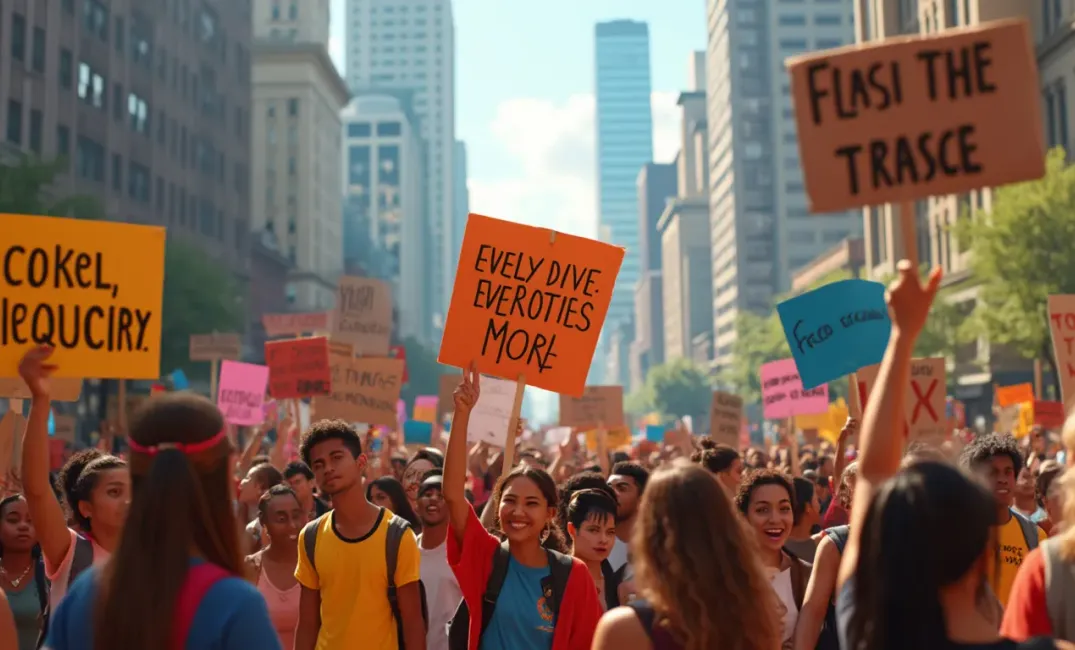Introduction: Seeds of Transformation
Throughout history, social movements have served as powerful catalysts for transforming societies, challenging injustices, and igniting the pursuit of equality and freedom. These collective actions, driven by voices often marginalized and oppressed, reveal the relentless determination to alter the status quo and foster a world where every individual can thrive with dignity. This entry delves into the enduring legacy of human social movements, exploring their origins, strategies, triumphs, and the enduring hope they inspire for future generations.
"Change does not roll in on the wheels of inevitability, but comes through continuous struggle." — Martin Luther King Jr.
Inception and Evolution: The Birth of Social Movements
The Roots of Collective Action
- Early Forms of Dissent: The seeds of social movements can be traced to early forms of dissent and communal actions against dominant powers, from slave revolts in ancient times to peasant revolts during feudal eras, embodying the struggle against oppression and injustice.
- The Age of Enlightenment: Sparks of Rational Thought: The Enlightenment era inspired movements fueled by reason and liberty, as people began questioning monarchies, birthing revolutions like the American and French Revolutions, which were foundational to modern democratic principles.
Evolution of Tactics and Strategies
- Nonviolent Resistance and Civil Disobedience: Leaders like Mahatma Gandhi and Martin Luther King Jr. pioneered nonviolent strategies, using civil disobedience to peacefully challenge unjust laws, inspiring global movements for civil rights and independence.
- Digital Activism and the Rise of Social Media: The digital age transformed activism, with social media platforms becoming pivotal in mobilizing masses, spreading awareness, and organizing protests, exemplified by movements like the Arab Spring and #BlackLivesMatter.
Key Social Movements and Their Impact
The Struggle for Civil Rights
- The American Civil Rights Movement: Spanning the 1950s and 60s, this movement addressed racial segregation and prejudice, leading to landmark legislation like the Civil Rights Act of 1964, underscoring the enduring fight for racial equality.
- South African Anti-Apartheid Movement: Mobilized both nationally and internationally, this movement dismantled apartheid's racial segregation, leading to Nelson Mandela’s presidency and the establishment of a multiracial democracy in 1994.
Feminism and Gender Equality
- Suffrage and Women's Liberation: From suffrage campaigns to the women's liberation movement of the 1960s and 70s, these efforts sought gender equality, challenging patriarchal norms and achieving milestones such as voting rights and workplace equality.
- Contemporary Feminist Movements: Modern feminism tackles intersectional issues like wage gaps, reproductive rights, and gender-based violence, using platforms like social media to amplify marginalized voices globally.
Environmental Movements
- The Rise of Environmental Activism: Beginning in the late 20th century, movements like Earth Day and the work of activists like Greta Thunberg emphasize climate action and environmental stewardship, pressing governments for sustainable policies and accountability.
- Indigenous Environmental Advocacy: Indigenous communities have long defended natural resources, highlighting sustainable practices and resisting exploitative projects, fostering alliances with wider environmental coalitions.
Mobilizing for Social Justice: Challenges and Triumphs
Confronting Barriers and Opposition
- Governmental and Institutional Resistance: Social movements often contend with entrenched power structures, facing repression, censorship, and legal challenges as authorities attempt to maintain control over dissenting voices.
- Internal Struggles and Fragmentation: Movements face internal divisions and strategic disagreements, necessitating adaptive leadership and cohesive strategies to maintain momentum and unity in pursuit of shared goals.
Achieving Lasting Change
- Legislative and Policy Reforms: Successful movements have led to transformative legal and policy changes that address systemic inequalities, such as marriage equality, labor rights, and anti-discrimination laws, reflecting civic empowerment.
- Cultural Shifts and Attitudinal Change: Beyond legal victories, movements have shifted cultural narratives, fostering inclusivity and broader societal acceptance of diversity, tolerance, and respect for human rights.
The Globalization of Social Movements
Cross-Border Solidarity and Global Networks
- Transnational Advocacy and Collaboration: Social movements increasingly collaborate across borders, forming global networks that exchange strategies and amplify voices, illustrated by movements like Extinction Rebellion and #MeToo.
- The Role of International Bodies: Organizations like the United Nations support advocacy by promoting human rights and sustainable development goals, reinforcing the interconnectedness of global social justice endeavors.
Challenges in the Global Landscape
- Cultural Nuances and Global Contexts: The globalization of movements requires sensitivity to cultural contexts and local challenges, ensuring inclusivity and relevance while promoting global solidarity.
- Digital Divide and Access Inequality: While digital platforms democratize activism, disparities in access and resource allocation pose challenges, necessitating efforts to bridge the digital divide for inclusive participation.
The Future of Social Movements: Pathways to Progress
Embracing Innovation and Diversity
- Harnessing Technological Advancements: The integration of technology, from blockchain to virtual reality, can reshape activism by enhancing transparency, organizing, and storytelling, fostering innovative approaches to engagement.
- Fostering Diverse Leadership and Inclusion: Diverse leadership models that include voices from marginalized communities ensure movements remain representative, dynamic, and responsive to changing social landscapes.
Building Resilience for Sustainable Impact
- Continuous Education and Advocacy: Educating the public and cultivating empathetic understanding are central to sustaining movement goals, creating informed communities aligned with principles of justice and equality.
- Institutionalizing Change for Long-Term Impact: Embedding movement principles within societal institutions, from education to corporate governance, transforms ephemeral successes into foundational societal norms.
Conclusion: The Enduring Legacy of Shared Struggles
Social movements are the lifeblood of societal evolution, embodying humanity’s relentless pursuit of justice, equity, and empowerment. They bridge the past and present, igniting hope and awakening consciousness for an inclusive future defined by shared struggles and collective triumphs.
As we navigate the complexities of modern society, the legacy of social movements serves as a beacon, illuminating paths toward positive change. By fostering compassion, collaboration, and resilience, humanity can shape a world where freedom, dignity, and equality are not dreams deferred, but enduring realities for generations to come.
"The arc of the moral universe is long, but it bends toward justice." — Theodore Parker, popularized by Martin Luther King Jr.
ENVIRONMENTAL MOVEMENT, EQUALITY, NONVIOLENT RESISTANCE, TECHNOLOGICAL ACTIVISM, SOCIAL MOVEMENTS, JUSTICE, GLOBAL MOVEMENTS, CIVIL RIGHTS, FEMINISM, ACTIVISM

